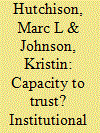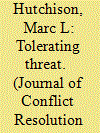|
|
|
Sort Order |
|
|
|
Items / Page
|
|
|
|
|
|
|
| Srl | Item |
| 1 |
ID:
113137


|
|
|
|
|
| Publication |
2012.
|
| Summary/Abstract |
Are citizens in consensus democracies with developed direct democratic institutions more satisfied with their political system than those in majoritarian democracies? In this article, individual-level data from the second wave of the Comparative Study of Electoral Systems and an updated version of Lijphart's multivariate measure of consensus and majoritarian democracy covering 24 countries are used to investigate this question. The findings from logistic multilevel models indicate that consensual cabinet types and direct democratic institutions are associated with higher levels of citizens' satisfaction with democracy. Furthermore, consensus democracy in these institutions closes the gap in satisfaction with democracy between losers and winners of elections by both comforting losers and reducing the satisfaction of winners. Simultaneously, consensus democracy in terms of electoral rules, the executive-legislative power balance, interest groups and the party system reduces the satisfaction of election winners, but does not enhance that of losers.
|
|
|
|
|
|
|
|
|
|
|
|
|
|
|
|
| 2 |
ID:
109193


|
|
|
|
|
| Publication |
2011.
|
| Summary/Abstract |
Civil conflict and state failure has often been linked to breakdowns in regime legitimacy. Trust in government is a critical element of regime legitimacy and the state's ability to mediate between the demands of competing groups within society. We contend that government capability is a primary factor in shaping individuals' ascription of legitimacy to the state. Capable governments foster perceptions of legitimacy while poor institutional performance decreases the degree to which individuals trust their government. While some tests of this relationship exist in extant literature, much of the work fails to integrate both micro- and macro-level factors, is confined to regions with established state performance, or is based on single-country studies. Our approach avoids many of these deficiencies by using 32 Afrobarometer surveys collected across 16 different countries from 2000 to 2005 and employing hierarchical linear models to estimate the effects of temporal-specific, state-level variables on levels of individual trust. We find that higher institutional capacity is associated with increased levels of individual trust in government across African countries. Furthermore, we demonstrate that this effect on political trust is independent of other individual-level attitudes, socio-economic characteristics, and a state's prior internal conflicts.
|
|
|
|
|
|
|
|
|
|
|
|
|
|
|
|
| 3 |
ID:
133714


|
|
|
|
|
| Publication |
2014.
|
| Summary/Abstract |
Research on civil conflict focuses primarily on identifying underlying and proximate causes while leaving many questions of subsequent social consequences unanswered. Few studies have systematically examined how these conflicts affect public opinion, especially tolerance attitudes. Additionally, cross-national comparisons reveal significant differences in political tolerance levels but few explanations accounting for this variation. In this study, I bring together these disparate literatures and demonstrate the negative, independent effects of civil conflict on political tolerance levels across thirty-two countries. Examining data from the 1995-97 World Values Survey using several statistical techniques to ameliorate problems with endogeneity and multilevel data, I find that civil conflict dampens the public's willingness to extend basic civil liberties to nonconformist groups. By assessing the extent of domestic intolerance generated by various forms of civil conflict, this study makes important contributions to existing literatures and, more importantly, identify another obstacle to sustained peace in postconflict societies.
|
|
|
|
|
|
|
|
|
|
|
|
|
|
|
|
|
|
|
|
|